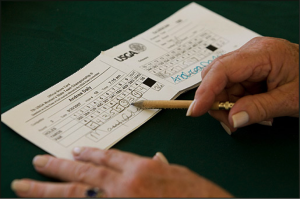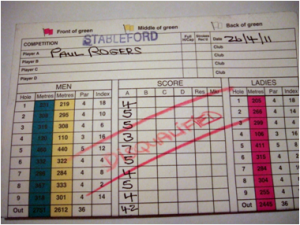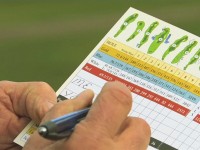Club Golf Academy is here to help yet again! The little 4.5 x 12 inch piece of paper that you pick up in the clubhouse before each round may be more important than every club in your bag combined. Without a proper scorecard, none of your shots during the round can be accurately recorded.
Prior to the start of play each day at NCCGA tournaments, club presidents will receive a scorecard for each player. Scorecards will have the course layout, giving players a better sense of where the hazards are on each fairway and where each hole is located on the green. The scorecard will aid in club selection off of the tee and on the second shot.
One unique aspect of NCCGA tournaments is that you will be playing with people who represent their school so it is a good place to start the conversation with your playing partners. Make sure to introduce yourself to your group and get to know them. You can ask them what year they are in school, what their major is, etc. After exchanging pleasantries on the first tee, you should take your scorecard, write your name on the top line if it hasn't been printed for you by the course, and exchange it with one of your playing partners from a different school. Then print your name on one of the lines below your competitor’s name. From here on out, the player’s name which is across the top (the person you exchanged cards with) will be known as the “competitor” and you will be known as the “marker.”
 Throughout the course of the round, you will record your competitor’s scores across the top of the card next to his/her name and your scores next to where you printed your name. At the end of each hole, you should announce your score on the previous hole to your playing competitors. If each player does so then it helps keep every player honest about his/her score.
Throughout the course of the round, you will record your competitor’s scores across the top of the card next to his/her name and your scores next to where you printed your name. At the end of each hole, you should announce your score on the previous hole to your playing competitors. If each player does so then it helps keep every player honest about his/her score.
At the conclusion of the round, you and your playing partner should sit down together to review your scores for each hole. You should begin by having your competitor read your scores from the card that he/she holds. You can confirm the hole-by-hole scores based on the scores that you recorded on the card that you hold. If any discrepancies arise, you and your competitor should talk through the hole and go over each shot you hit. If you still don’t agree, go to the Regional Coordinator to talk through the hole with him/her. At this time, you should also review any rulings in question with the Regional Coordinator or course professional. After you have confirmed your scores, you should go through the same process as before, reading your competitor his/her scores for every hole. Once you have confirmed each score, you and your competitor should exchange scorecards and physically examine your scorecard to ensure that your scores are correct, using the scores that you recorded on your competitor’s card. After you and your playing competitor are satisfied, you should sign your card along the bottom where it says “Competitor’s Signature” and sign your competitor’s card along the bottom where it says “Marker’s Signature.”
You and your competitor should then meet with the two other members of your group. One member of each foursome should hand in all four scorecards to the Regional Coordinator who will input each score into the scoring system. All four players should double check their scores later online to ensure they are correct. Additionally, the RC will be writing the scores on the scoreboard as well. Direct any scoring concerns or questions to your Regional Coordinator, who will be available to help you if issues arise.
 So, you may be asking yourself, why so much fuss over such a small piece of paper? Well, once you sign your scorecard and turn it in, the total of all of your hole-by-hole scores will be your score for the round. If you sign an incorrect scorecard and turn it in, one of two things will happen. If you sign and turn in an incorrect scorecard with a total score higher than your actual score, the total of the scores on the scorecard will stand as your official score and nothing more will happen. If you sign and turn in an incorrect scorecard with a total score lower than your actual score, you will be disqualified. In NCCGA tournaments, it is up to the Regional Coordinator to determine whether someone who is disqualified in the first day of a tournament can play the second day.
So, you may be asking yourself, why so much fuss over such a small piece of paper? Well, once you sign your scorecard and turn it in, the total of all of your hole-by-hole scores will be your score for the round. If you sign an incorrect scorecard and turn it in, one of two things will happen. If you sign and turn in an incorrect scorecard with a total score higher than your actual score, the total of the scores on the scorecard will stand as your official score and nothing more will happen. If you sign and turn in an incorrect scorecard with a total score lower than your actual score, you will be disqualified. In NCCGA tournaments, it is up to the Regional Coordinator to determine whether someone who is disqualified in the first day of a tournament can play the second day.
A little card can make a big difference in a tournament so take the extra time to make sure that everything is correct. It’ll save you a lot of trouble. If you have any rules questions, be sure to send them me, I will be able to discuss them in the next segment of Club Golf Academy.
For more information, check out Rule 6-6 from the USGA.
**Written by Nicholas Heyrman, National Collegiate Club Golf Association Director of Tournament Operations




